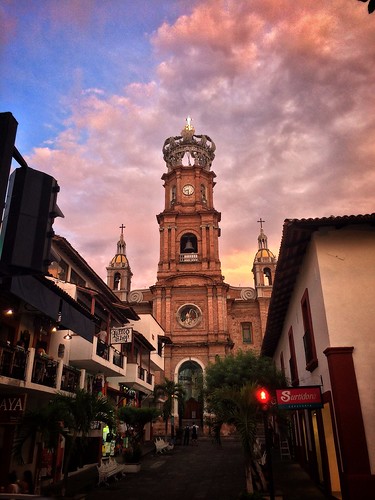Advent is a time of preparation for Christmas, just as Lent is a time of preparation for Easter. It starts each year on the fourth Sunday before Christmas, and ends on the evening of Christmas Eve. Over time, the emphasis has shifted from one of greater penitence and purification to one of joyful expectation, but either way the basic idea is the same: Advent is time we should be using to prepare our hearts to re-live the birth of the Lord and welcome him into our hearts. We should keep in mind that Christmas (like other liturgical celebrations) is more than just the celebration of the memory of things past. When we participate in the Church’s liturgy, the action of the Holy Spirit makes us present to the events that we celebrate:
Christian liturgy not only recalls the events that saved us but actualizes them, makes them present. The Paschal mystery of Christ is celebrated, not repeated. It is the celebrations that are repeated, and in each celebration there is an outpouring of the Holy Spirit that makes the unique mystery present. (Catechism of the Catholic Church, 1104 – emphasis added)
Therefore, it is worth preparing ourselves well to participate and benefit fully from the celebration of Christmas. To that end, I offer the following 5 tips:
1. Learn a new Advent hymn.
Most Catholics already know “O Come, O Come Emmanuel”, but if my personal experience reflects the general reality, few congregations really learn any other Advent songs; we do our best to sing along with the cantor and/or choir at Sunday Mass, but since there are only four Sundays to Advent each year, we rarely really learn new songs specific to the season. And yet, good liturgical music for Advent can help us a lot. These songs speak of the Lamb who frees us from sin and darkness, who brings us light and hope. During Advent we also think of his second coming at the end of time, when he will take those who love him to heaven for all eternity. The words and music of these songs work together to convey a message of faith, hope, love and anticipation for the coming of the Savior. It’s worth adding a new one to our repertoire to reflect on and hum or whistle while we are in the car or in the shower.
2. Make an Advent resolution.
I’m not suggesting you give up chocolate or Christmas cookies like you would during Lent. However, it is a time of preparation. We can think of our soul as the manger that is preparing to receive Christ Christmas night. Surely, Joseph did what he could – as little as it may have been – to clean the stable and make it comfortable for Mary and the baby Jesus. We should do the same with our soul: try to clean it of sin, and make it a welcoming place by loving God in our neighbor. For example, we might make a resolution to be more generous with those around us who are in need, to reach out to someone who would otherwise celebrate the holidays alone, or – perhaps more difficult – not to judge all the friends, family members and co-workers that we will see at Christmas parties throughout the month, and with whom we may have political, ideological or personal differences. Another good resolution (complementary to the kind I just mentioned) would be to go to the sacrament of Reconciliation at least once at the beginning of Advent and once at the end. Of course, each of us has to see what we need to do to be better prepared, and that depends on our personal situation.

3. At least once during Advent, pray a segment of the Liturgy of the Hours.
The Liturgy of the Hours (aka the breviary), especially during Advent, presents us with psalms and texts that speak of the promise of the Messiah. Christian liturgy has its roots in Jewish liturgy, and the Old Testament texts are drawn from Jewish sources; it’s probable that Mary and Joseph were reflecting on some of these same texts as they awaited the birth of their Son, whose mission is foretold in beautiful, often mysterious and symbolic language. By praying with these texts we join ourselves to them awaiting the coming of the Lord.
It might seem intimidating if you pick up a print copy of the Liturgy of the Hours for the first time, but many churches offer directed community prayer of Morning Prayer or Vespers. If that doesn’t fit your calendar, you can pray on your own using one of the available smartphone apps, or a website like the following:

It doesn’t have to take long, either; some of the shorter “hours” such as mid-day prayer last no more than 5 minutes or so if prayed privately.
4. Don’t use up all your Christmas spirit before Christmas.
For secular culture, Christmas ends no later than midnight on December 25. For Catholics, Christmas begins on December 25 and ends little by little over the next several weeks. First, there is the “Octave of Christmas” – the eight days from Dec. 25 to Jan. 1, which are celebrated with special joy and liturgical solemnity. Then there are the remaining four days until January 6, the traditional date of the Feast of the Epiphany, which are still part of the famous “12 Days of Christmas.” But, it’s not over yet! The Christmas season extends all the way to the first Sunday after the Epiphany. In 2015, that’s January 11.
So, while we may enjoy all the “Christmas” parties and events that happen during Advent and lead up to the 25th, let’s not forget that Christmas isn’t over until more than two weeks later. It’s good to keep our sense of expectation alive, even though the celebrations have already begun. Especially for families with children, it can be a good idea to stretch out some of the festivities and activities at least until the Feast of the Epiphany so that Advent conserves its sense of preparation, and we keep a sense of the meaning of Christmas as not being strictly tied to the secular, commercial celebration.
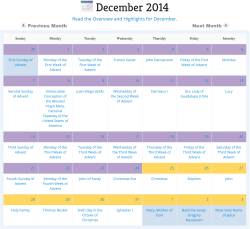

5. Revive a family tradition, or start a new one
Traditions have a cultural and sentimental value, but they are also much more than that. They are means of teaching and keeping alive values and stories that help make up our identity. I still remember the Advent calendars that my mother made for my brother and me when I was small. Each morning she would add something to the calendar for the day – a note with instructions, a small gift, a Christmas-themed image… Those notes might tell us to read a specific Advent-related Scripture passage, or do a good deed, or tip us off to some treat that we had to search for in the form of a treasure hunt. Sometimes the small gift wasn’t for us; it was for us to give to someone else! It was a fun activity that also taught us about our faith and the importance of giving to others. Similarly, a friend told me that when he hears the word “Advent” he remembers his grandmother gathering the family in a candle-lit room to pray the Rosary together and sing hymns on the nights leading up to Christmas.
Many families have Advent traditions, but sometimes they fall into disuse. This is a great time to revive those traditions, if need be, or to create new ones, that will help everyone to grow in their faith and in their love for this special season, creating lasting memories that help our beliefs and values to penetrate our hearts and minds.

Advent wreath
And especially for these purposes, “family” doesn’t have to be just blood relatives. When we were baptized into Christ, we were baptized into his Body, and Christ died for all, regardless of race, tribe or nation. We are all related by his Blood, if not by our own. Our family can include anyone we love, of course, but Advent and Christmas are also great times to show our love by welcoming people who are lonely, sick, or poor, those who mourn, and those who are far from home (see Mt 25:34-6)
If you want some more ideas for Advent tips, activities and traditions, CatholicCulture.org has a special part of their website dedicated to this topic.



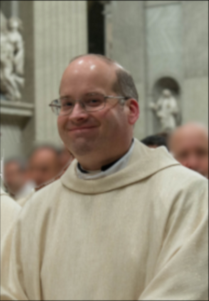
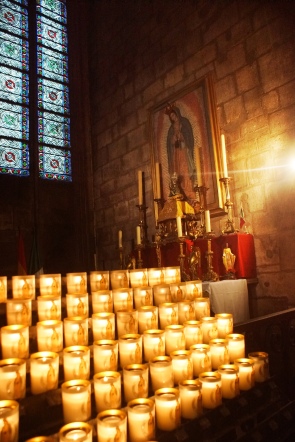





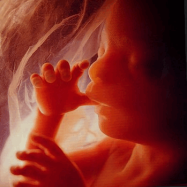 When a child grows in his or her mother’s womb, the mother and child have a special symbiotic relationship. As
When a child grows in his or her mother’s womb, the mother and child have a special symbiotic relationship. As  Think about that for a moment. If this science is correct, then Mary was probably carrying around living cells from Jesus’ body inside her own. Catholics believe that Jesus’ body is inextricably joined to his divinity (just think of the Eucharist). So, if all of this is true, then Mary’s body was, in a certain real and physical sense, permeated by God’s presence, in a way far more intimate even than when people receive Communion. Think of the effects the Church attributes to receiving Communion, and intensify that immeasurably.
Think about that for a moment. If this science is correct, then Mary was probably carrying around living cells from Jesus’ body inside her own. Catholics believe that Jesus’ body is inextricably joined to his divinity (just think of the Eucharist). So, if all of this is true, then Mary’s body was, in a certain real and physical sense, permeated by God’s presence, in a way far more intimate even than when people receive Communion. Think of the effects the Church attributes to receiving Communion, and intensify that immeasurably.


